 Petzlover
Petzlover Glen of Imaal Terrier is originated from Ireland but Newfoundland Dog is originated from Canada. Glen of Imaal Terrier may grow 38 cm / 14 inches shorter than Newfoundland Dog. Glen of Imaal Terrier may weigh 64 kg / 141 pounds lesser than Newfoundland Dog. Glen of Imaal Terrier may live 4 years more than Newfoundland Dog. Glen of Imaal Terrier may have less litter size than Newfoundland Dog. Glen of Imaal Terrier requires Low Maintenance. But Newfoundland Dog requires Moderate Maintenance
Glen of Imaal Terrier is originated from Ireland but Newfoundland Dog is originated from Canada. Glen of Imaal Terrier may grow 38 cm / 14 inches shorter than Newfoundland Dog. Glen of Imaal Terrier may weigh 64 kg / 141 pounds lesser than Newfoundland Dog. Glen of Imaal Terrier may live 4 years more than Newfoundland Dog. Glen of Imaal Terrier may have less litter size than Newfoundland Dog. Glen of Imaal Terrier requires Low Maintenance. But Newfoundland Dog requires Moderate Maintenance
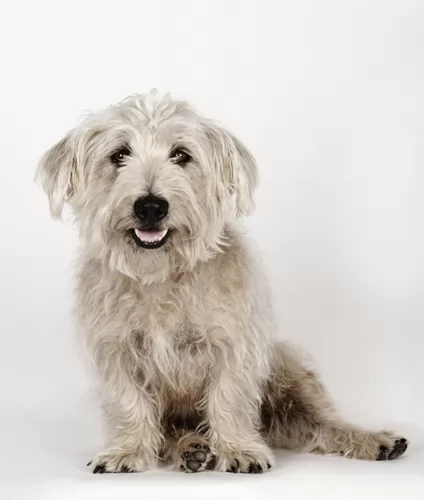 Hailing from Ireland and known also as the Wicklow Terrier or just Glen, the Glen of Imaal Terrier was used to get rid of rats, badgers and otters as well as being a good all-round farm dog.
Hailing from Ireland and known also as the Wicklow Terrier or just Glen, the Glen of Imaal Terrier was used to get rid of rats, badgers and otters as well as being a good all-round farm dog.
Using his strength, he was good at digging into burrows to root out badgers, but unlike other terriers, he wouldn’t go on and on yapping around his prey. He isn’t an excessive barker.
The terrier was recognised by the Irish Kennel Club in 1934 and later by the American Kennel Club in 2004. The Canadian Kennel Club recognized Glens in 2017.
 The Newfoundland dog is a large working dog. They were bred and used as a working dog for fishermen in the Dominion of Newfoundland, an eastern province of Canada. With their web feet they were also used for water rescue.
The Newfoundland dog is a large working dog. They were bred and used as a working dog for fishermen in the Dominion of Newfoundland, an eastern province of Canada. With their web feet they were also used for water rescue.
The history of the Newfoundland Dog is unsure, but the breed as we know it today originated from dogs which were brought from Newfoundland to England in the early 1800's.
The Newfoundland Club was founded in 1886 so as to promote the breed.
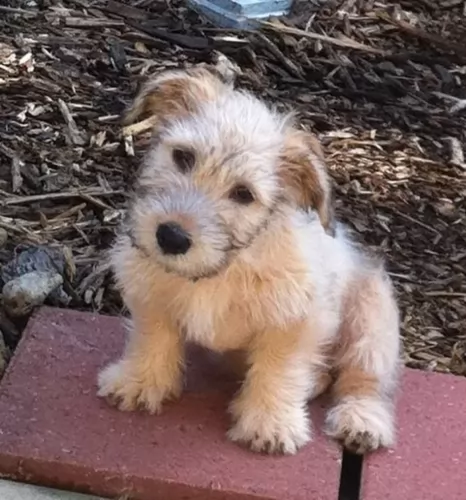 An interesting fact with the Glen of Imaal Terrier is that this is a dwarf breed, being a big sized dog on short legs, with the front feet turning out.
An interesting fact with the Glen of Imaal Terrier is that this is a dwarf breed, being a big sized dog on short legs, with the front feet turning out.
A typical Glen of Imaal Terrier stands at roughly 30 – 36cm and weighs up to about 16kg. Another interesting aspect with this dog is that it can take up to 4 years to reach maturity.
The head of this muscular dog is large, the ears are half erect, and while the tail has always been traditionally docked, it is often left long. The double coat of the dog is soft with the undercoat but he has a wiry outercoat. The color of the coat is essentially wheaten, tan or blue. The coat doesn’t shed much but some Glen owners strip excess hair a few times during the years.
Glen of Imaal terriers are energetic, easygoing and they make splendid pets for any family. He is more than happy to give up lying around for games and activity just to lie at his owner’s feet. He is an intelligent dog too and even though he is somewhat stubborn, he responds well to training and socialization. In fact training and socialization is important for every dog breed to prevent negative behavior and to ensure your pet is obedient.
 The Newfoundland is a large dog standing at between 63cm to 74cm, both male and female. Weight can vary from 45kg to 80kg.
The Newfoundland is a large dog standing at between 63cm to 74cm, both male and female. Weight can vary from 45kg to 80kg.
He has a double coat of medium-length straight hair and the hair can be black, brown or gray. Although it is common for the Newfoundland to have a solid-colored coats, you will sometimes find small patches of white on their chest, toes, or at the tip of the tail. Then again you get the less common Newfoundlands where the coat is white with some black markings and these are known as Landseers.
The outer coat is coarse, oily and water-resistant quality, suited to a dog that loves to spend time in the water. The head is broad and large with small ears that he keeps lying close to his head. The tail is long and plumed and the feet are wide with webbing between the toes which aids him with swimming.
As with many large dogs, the Newfoundland is docile and his sheer size makes it that he is best suited to life in the countryside as opposed to living in the city. This is also because this particular dog wants to be close to water where he can swim.
He is a trustworthy, loyal dog and will get on well with children and pets in the home. Training and socialization is always recommended for any dog, but a big dog can often ‘get in the way’ indoors and you want him to lie down or sit when you tell him to. He is an intelligent dog so will respond well to training.
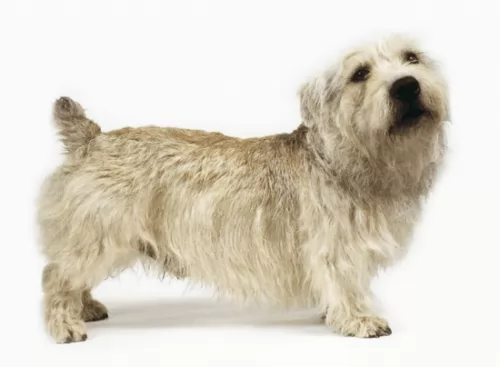 The Glen of Ismaal Terrier is more docile than other terrier breeds, but that doesn’t mean he isn’t feisty. He loves to play and is an adventurous dog, always on the lookout for exciting opportunities and to chase prey.
The Glen of Ismaal Terrier is more docile than other terrier breeds, but that doesn’t mean he isn’t feisty. He loves to play and is an adventurous dog, always on the lookout for exciting opportunities and to chase prey.
He is a good natured pet and he gets on well with adults, children and pets in the home. He can adapt well to life in the city or in the countryside so long as he is with his family members.
He isn’t a couch potato dog though, and wherever he lives, he will need a good amount of exercising. Treat him with the love and respect he craves, and you’ll have a wonderful canine companion.
 Your beautiful, cuddly puppy will soon become a giant dog with a big appetite. Don’t just buy a cute puppy if you can’t afford to feed him properly and you can’t give him lots of attention.
Your beautiful, cuddly puppy will soon become a giant dog with a big appetite. Don’t just buy a cute puppy if you can’t afford to feed him properly and you can’t give him lots of attention.
Your dog will also be shedding, so be aware of these aspects before you bring a large Newfoundland into your home. He is a gentle dog, but his size could be worrisome if he isn’t trained, socialized and supervised.
Newfoundlands are amicable dogs, and while he may like to spend times indoors with you relaxing, he is a working dog and will require exercise and activities for mind and body.
Give this giant of a dog a loving home, and you will have a special, devoted friend like no other.
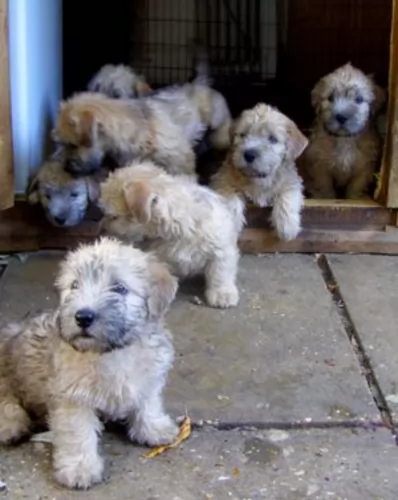 The Glen of Imaal Terrier is a feisty, healthy breed, particularly when he gets the best food there is, then he is not likely to get ill easily.
The Glen of Imaal Terrier is a feisty, healthy breed, particularly when he gets the best food there is, then he is not likely to get ill easily.
However, just like other dogs, he can be prone to certain health conditions such as hip dysplasia. When a dog is diagnosed with hip dysplasia, the socket part of the joint is poorly developed, so that is causes abnormal friction.
Inflammation and pain can be the result and your dog can become lame. Unfortunately, rapid weight gain with puppies can put more stress on the hips, and diets without the right balance of vitamins and minerals can be bad for good bone development.
 The Newfoundland can be prone to serious health conditions such as hip dysplasia and gastric torsion. Deep chested dog breeds like the New Foundland are susceptible to bloat, a life threatening condition where the stomach swells, it can twist and the dog can die if help isn’t available. He will be salivating, restless and whining while also trying to vomit.
The Newfoundland can be prone to serious health conditions such as hip dysplasia and gastric torsion. Deep chested dog breeds like the New Foundland are susceptible to bloat, a life threatening condition where the stomach swells, it can twist and the dog can die if help isn’t available. He will be salivating, restless and whining while also trying to vomit.
Giant breeds are also prone to elbow and hip dysplasia, a genetic problem which can ultimately affect your dog’s mobility.
When in any doubt about your pet’s health, get him to the vet.
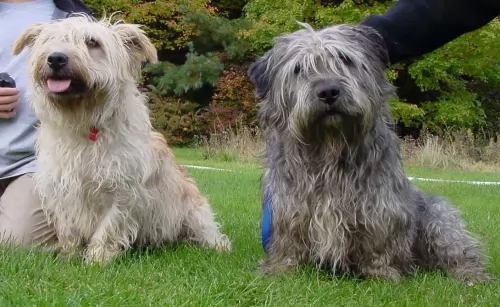 Caring for a Glen of Imaal isn’t going to be a huge job. This is what makes him such a wonderful pet as he is a straightforward pet, requiring little more than a brush to avoid the hair matting.
Caring for a Glen of Imaal isn’t going to be a huge job. This is what makes him such a wonderful pet as he is a straightforward pet, requiring little more than a brush to avoid the hair matting.
Check his ears, teeth and nails from time to time to ensure he is always in tip top condition.
If you intend making use of the convenience of commercially manufactured dog foods, the top quality one will provide you with balanced nutrition for your Glen and you can mix in some cooked brown rice, vegetables and chicken from time to time.
The Glen of Imaal Terrier is a small-breed dog and, he should be offered dog food that has been specially formulated for small, energetic dog breeds. You can also add in a little bit of raw meat into his kibble as a treat as this is important for keeping him free of skin allergies.
Make sure he always has a bowl of fresh, cool drinking water.
 Your dog’s coat will need to be brushed at least twice a week as he is a heavy shedder.
Your dog’s coat will need to be brushed at least twice a week as he is a heavy shedder.
Do the nails of your dog as soon as they start getting long. Long nails can hook on things and cause injury to the dog’s paw area.
This is a dog with floppy ears so check inside the ears to prevent ear infections, more so because this is a water-loving dog. The dampness inside the ears can cause bacteria.
This is a giant breed and sadly, they have the shortest lifespans. You want to make sure that you keep your giant breed as healthy as possible to ensure he reaches the 10 or so years allotted to him and to also prevent health problems.
Make sure your giant breed puppy and adult has the very highest quality commercially manufactured food to ensure he gets the right balance of nutrients in. This food also makes sure that your puppy rather grows at a slower rate and stronger as opposed to growing too quickly. Rapid growth comes with joint problems.
All dogs, large and small, don’t want exotic, strange food that upsets their stomachs. They want consistency and simplicity and they want tasty food. Give him some homemade food such as cooked chicken, brown rice or pasta and some vegetables such as sweet potato, carrots and spinach. You can add this occasionally to his dry kibble.
Add in some raw meat from time to time too. Your pet will be strong, healthy, happy and content.